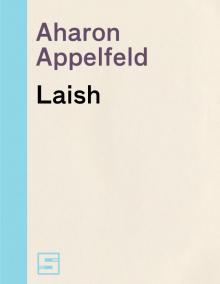- Home
- Aharon Appelfeld
Suddenly, Love
Suddenly, Love Read online
ALSO BY AHARON APPELFELD
Badenheim 1939
The Age of Wonders
Tzili
The Retreat
To the Land of the Cattails
The Immortal Bartfuss
For Every Sin
The Healer
Katerina
Unto the Soul
Beyond Despair: Three Lectures and a Conversation with Philip Roth
The Iron Tracks
The Conversion
The Story of a Life
A Table for One
All Whom I Have Loved
Laish
Blooms of Darkness
Until the Dawn’s Light
This is a work of fiction. Names, characters, places, and incidents either are the product of the author’s imagination or are used fictitiously. Any resemblance to actual persons, living or dead, events, or locales is entirely coincidental.
Translation copyright © 2014 by Schocken Books, a division of Random House LLC
All rights reserved. Published in the United States by Schocken Books, a division of Random House LLC, New York, and in Canada by Random House of Canada Limited, Toronto, Penguin Random House companies. Originally published in Israel as Pitom Ahavah by Keter Publishing House Ltd., Jerusalem, in 2003. Copyright © 2003 by Aharon Appelfeld and Keter Publishing House Ltd.
Schocken Books and colophon are registered trademarks of Random House LLC.
Library of Congress Cataloging-in-Publication Data
Appelfeld, Aron, author.
[Pit’om ahavah. English]
Suddenly, love : a novel / Aharon Appelfeld;
translated from Hebrew by Jeffrey M. Green.
pages cm.
ISBN 978-0-8052-4295-9 (hardcover). ISBN 978-0-8052-4315-4 (eBook)
I. Green, Yaacov Jeffrey, translator. II. Title.
PJ5054.A755P5813 2014 892.43′6—dc23 2013039268
www.schocken.com
Jacket photograph © Françoise Lacroix/panoptika.net
Jacket design by Linda Huang
v3.1
Contents
Cover
Other Books by This Author
Title Page
Copyright
Chapter 1
Chapter 2
Chapter 3
Chapter 4
Chapter 5
Chapter 6
Chapter 7
Chapter 8
Chapter 9
Chapter 10
Chapter 11
Chapter 12
Chapter 13
Chapter 14
Chapter 15
Chapter 16
Chapter 17
Chapter 18
Chapter 19
Chapter 20
Chapter 21
Chapter 22
Chapter 23
Chapter 24
Chapter 25
Chapter 26
Chapter 27
Chapter 28
Chapter 29
Chapter 30
Chapter 31
Chapter 32
Chapter 33
Chapter 34
Chapter 35
Chapter 36
Chapter 37
Chapter 38
Chapter 39
Chapter 40
Chapter 41
Chapter 42
Chapter 43
Chapter 44
Chapter 45
Chapter 46
Chapter 47
Chapter 48
Chapter 49
Chapter 50
Chapter 51
Chapter 52
About the Author
1
ERNST TURNED SEVENTY, AND FOR HIS BIRTHDAY IRENA baked a cheesecake and decorated it with strawberries.
“Happy birthday,” she says and places the cake on the table.
“At my age, one no longer celebrates,” says Ernst without looking at her.
“That’s not true,” Irena replies, frightened by the words as they emerge from her mouth.
Irena has been working in Ernst’s house for two years, since his operation. She arrives every day at eight and leaves at three. Some days she stays longer. They speak little, but sometimes Ernst surprises Irena with a question, or an idea that is preoccupying him.
“Why did you think of baking a cake for me?” he asks without raising his eyes.
“I thought it would make you happy.” She answers in a full sentence.
“Me?”
“Cheesecake always makes people happy,” Irena says and is pleased with her reply.
“I enjoy a good cake,” Ernst says, “but it doesn’t make me happy.”
Irena doesn’t understand the difference and doesn’t answer.
“At my age happiness is tiring,” he adds.
A year earlier Ernst was still reserved with Irena, but her diligence and devotion won his heart. Now he leans forward to listen when she offers advice about the house or tells him about something she found interesting. But Irena speaks little. The few words that leave her mouth during the day are measured. She knows that Ernst doesn’t like to chat or tell jokes. He is pleased when she takes a hint or guesses instead of asking him straight out. Ernst constantly surprises Irena. Yesterday he told her, “I wouldn’t have wanted to live a different life.” For a moment she was perplexed. His life hasn’t been a bed of roses.
Irena sits in a corner without looking at Ernst. She likes to serve him food and wait for his reaction, but she is careful not to disturb his thoughts. Sometimes he sinks so much into himself that he forgets to eat. Ernst speaks to Irena in German, now and then with a Yiddish word and sometimes also a sentence in Hebrew. He says that his memory has weakened since the operation. Irena doesn’t notice that. The words that come from his mouth are clear, and she understands his requests without any explanation. She has noticed: Ernst seldom describes things, but sometimes he says something so fresh that it’s like a pear that was just peeled and placed on a plate. He also has little customs that she likes: putting on a hat before leaving the house, bowing when she hands him his walking stick.
“I never imagined I’d reach the age of seventy,” Ernst says, as though to himself.
“Thank God,” Irena cries out.
Ernst doesn’t like this display of religiosity, but he makes no comment.
“Seventy is a fine age,” she adds.
“It’s no different from any other age: you’re just weaker, and your memory betrays you more frequently.”
Irena doesn’t agree with him. Ernst is alert. He reads and writes. When he goes for a walk, his posture is erect and his bearing stands out.
“You say that seventy is a fine age.”
“Am I mistaken?” She responds immediately.
“Of course you’re mistaken.”
By now Irena knows that the word “mistaken” doesn’t always indicate disagreement. Sometimes it implies unspoken agreement with slight provocation.
The day is nearly over. Irena has tidied the kitchen and set the table for supper. She puts on her coat and wishes Ernst a good night.
The way home is not long. Irena lives in the Old Katamon neighborhood of Jerusalem, a twenty-minute walk from Ernst’s house. Not long ago, her life had been scattered, her days vexed and pointless. She used to stand in the street and wonder whether to take a long walk or return home. Now she walks slowly, a bit tired, but full of words and the sounds of words that she had absorbed during the day.
Irena’s apartment has three rooms, and a kitchen and a balcony. Here she grew up, and here her parents died. After their death she preserved their memory with little ceremonies she invented. Since she started working for Ernst, Irena has done less of that, but she still goes to the cemetery on their birthdays and on the anniversari
es of their deaths. On the Sabbath and holidays she arranges the house exactly the way her mother did. But most of her thoughts are now devoted to Ernst. Sometimes, when her fears get the better of her, she goes back to visit him in the evening. She serves him a cup of tea or peels an apple for him. Since she started working for Ernst, Irena has stopped going downtown, and she doesn’t even go out for short strolls.
2
“YOU WERE BORN IN ISRAEL, ISN’T THAT RIGHT?” ERNST surprises her again the next day.
“No. I was born in a displaced persons’ camp near Frankfurt.”
“I was sure, for some reason, you were born in Israel.”
“I don’t remember anything about it,” Irena says, and immediately regrets it. Her parents had nurtured the memory of that camp to the point where sometimes it seemed to her that she remembered the smallest details. Her parents had met there. Her mother had become pregnant and only in the sixth month of her pregnancy had they been married, by an American army rabbi. Her mother had told her this at the end of her life. In any event, that DP camp near Frankfurt had been impressed in Irena’s memory, and sometimes she dreamed about it. Sorry, I do remember. She is about to take back her words, but she immediately sees that this would be foolish.
Ernst is in a good mood this morning. He reads the newspaper and jokes about a political hack who is pretending to be an honest man. “Just like before the war. They say that life doesn’t repeat itself. That’s a mistake. It does repeat itself.” Ernst reads newspapers and is well informed about events in the country. Five years earlier he divorced Sylvia, his second wife, and quit his job. About Sylvia, who immigrated to Vienna, he speaks little, just a scornful remark here and there.
Irena doesn’t ask, but the bits that she catches during the day seep into her soul. Ernst’s few words sometimes are scalpel-sharp. At first she thought he was a lawyer. His acuity frightened her. But now she knows that it was the discipline of the last few years. He writes for three hours in the morning and for two or three hours in the evening. And he takes two strolls, one in the morning to the café and another at night, which he calls the “march.” That discipline, or whatever you might call it, imbues his behavior with sharpness and sometimes impatience. But it isn’t directed at her.
At nine every morning Ernst goes out to the café and sits there for an hour and a half, or sometimes two hours. Most of the customers are strangers to him, but he doesn’t feel isolated. Since Irena’s arrival, Ernst’s life has changed. She takes care of everything. The kitchen, where confusion always ruled, is tidy and gleaming. The living room is bright, and even the bookcase, his most intimate domain, is different from what it was. Ernst likes to sit at home, and when he goes out, he yearns to return.
When Ernst saw Irena for the first time, to tell the truth, she didn’t please him: she was short and barely uttered a word. But before long he began to find her ways pleasant; her face was bright, and even her stammering had some charm. Since her arrival, Ernst has been rising early, shaving, and sitting at his desk. Irena arrives exactly at eight and prepares breakfast for him, everything in measured portions and at the right temperature. More than once he has suggested that she join him, but she always refuses. Only after he has left the house does she make a cup of coffee for herself.
Until she began to work for Ernst, Irena’s whole life had been her parents. Her father was an electrician, and her mother stayed at home and kept house. Several times she had wanted to leave her parents’ home, but in the end she hadn’t. Her short stature and her shyness had kept her back. Irena’s mother had poured all the love she had into Irena’s heart. Later, after she died, Irena’s father had been like a mother to her as well. When he died, Irena stayed at home and cherished their memory. On Sabbaths and holidays she would set the table and light the candles, sit in her place, and imagine they were at her side. She made no changes in the house. What had been permanent became more permanent.
After her parents’ death, Irena worked in an old age home for a while. The old people were fond of her and gave her nicknames. But some of the old women tormented her, called her “tight-lipped,” and cursed her. One time an old woman threw a plate at her, and Irena decided to leave.
Fortunately for her, she didn’t need that job. Along with the apartment, her parents had left her their savings and the reparations they had received from Germany. In fact, she could have gotten by without working, but her imagination preyed on her, made her head spin, and finally drove her out of the house.
Years earlier her parents had tried to find a husband for her. They were men much older than she, short and crammed with urges. Irena had been so embarrassed she hadn’t even raised her head. At last they stopped pestering her. After her parents’ death, a man began to accost her, making advances every time she entered her building and went upstairs. One time he attacked her at the door to her apartment and pulled up her dress. She struggled with him and escaped into her apartment. For a long time she didn’t leave home.
So the years passed. Irena tidied the apartment just as her parents had done while they were alive. The thought that she was guarding their home, the kitchen and its utensils, the living room, the wide bed in her parents’ bedroom, her bedroom—this gave her strength. Not only would she envision her parents here, she would also sail away to their village in Galicia.
Once Irena’s mother came to her in a dream. Her advice was the same as when she was alive: You have to get out of the house, dear. You’re still young. Your life is before you. If not now, when? Irena wanted to tell her about the frightening man who had attacked her, but when she saw her mother’s face, the words stuck in her mouth. When Irena awoke the next morning, she was sorry that her mother hadn’t noticed that the apartment was tidy, just the way she had left it. In great pain, she wept.
Irena sat at home most of the time, as though it weren’t an apartment but a house of prayer, where one changes nothing and only preserves what is already there. With great caution she even shuttered the windows so the sun wouldn’t damage the furniture. The thin darkness in the summer was pleasant. In the winter she raised the shutters, but never the way her mother had done. Her mother used to open the windows every morning energetically. Irena hadn’t inherited that vigor from her.
3
AT TWELVE-THIRTY ERNST RETURNS FROM HIS JOURNEY, bringing with him everything he has collected in the café and on the street. His step is heavy, and his face is filled with concentration. He ought to sit at his desk and write down his thoughts. But he is too excited; he prefers to sit in the armchair and wait for Irena to announce that lunch is ready.
Ernst’s return today is different. He has brought a letter with him and immediately announces, “My ex-wife wrote to me. What did she write?” In his voice there is a mixture of faultfinding and contempt. He lays the letter on the table without opening it. Ernst has many ways of expressing reservations. Placing a letter on his desk without opening it is one of them. “My ex-wife wrote to me,” he repeats, knowing there would be no response to his words.
Irena has noticed: there is no trace of that wife in the house, but the memory of his first wife is evident in several places. A family photograph stands on the cupboard: Ernst in shorts, his wife hugging a baby. Irena occasionally studies the photograph. Sometimes it seems to her that she met them years ago. Once she dreamed that Ernst’s wife and daughter came to visit him, and she made a festive meal for them.
Ernst has finished his meal and is sitting in the armchair. At this hour he likes to read magazines or doze off. Irena restricts her activity so as not to make noise. When Ernst is asleep, his face is young and his forehead shines.
“It’s three-thirty, and you’re still working.” Ernst has awakened from his nap.
Irena thinks that she is disturbing him. She immediately puts the laundry in the wicker basket without folding it and heads for the door.
“Will you have a cup of tea?” he asks, turning to her.
“I’ll have one at home,” she says and
slips out of the house.
The letter from Sylvia has upset Ernst. They were married for five years, but their life together wasn’t happy. She was an opinionated woman, a former Communist, who expressed her views vehemently. Her ideas weren’t unreasonable, but the way she presented them made him furious. To shield himself from the torrent of her words, Ernst would lower his head or hide his face in his hands, but to no avail. She persisted. The house wasn’t a home. He prepared the meals himself. Her attitude toward his work was even more scandalous: in her heart she was contemptuous of him because, as she said, one shouldn’t write for the drawer. If you can’t publish, don’t write. Every statement of hers, every gesture, drove Ernst out of his mind.
Sylvia was a handsome woman, but her opinions belied her beauty. They strove only for the utilitarian. Something that brought no benefit should by rights not exist. She had spent the war years in Siberia, absorbing the cold and the contempt for Jews there, and when she reached Israel, nothing pleased her, neither the place nor the people. The years after their separation was a time of bitter spiritual accounting for Ernst.
Irena makes her way home slowly, almost without thinking. She doesn’t usually mull over her thoughts. If she happens on an interesting sight, she contemplates it and stores it up in her heart. Often the sight is revealed to her again in a dream. Sometimes a word gets stuck in her mind, plays there for a moment, and then disappears, going back to where it came from. But now the image of Ernst’s return from his walk reappears to her—the way he entered the house and laid the letter on his desk. His face had narrowed, as though he had been gripped once again by sounds that had previously let him go. When he sat in the armchair, his lips were twisted in disappointment.
Then a vision of tall, cold Sylvia accosts her as well. That woman, who in the past lost no opportunity to weaken Ernst, is trying to inject him with her venom now, too, from a distance, by means of letters. Serpent, Irena is about to call out, but since she has never used that word, it is stuck in her mouth.
Irena returns home as the last splinters of light are filtering through the slits in the shutters, and she immediately begins to arrange her parents’ armoire. The clothes are folded the way they always have been. She carefully removes them, shakes them out, and then puts them back. Irena does this once a month, so she can be involved in the silent life of the garments. The clothes have lost their odor but not their form. As Irena stands by the armoire, her mother sometimes appears and urges her to go out to a club and pass the time with friends. Nothing comes of all that urging. Irena used to go to the movies with her father and sometimes with her mother. Her father was a good-looking man, and she enjoyed going out with him.

 Long Summer Nights
Long Summer Nights Tzili
Tzili The Conversion
The Conversion The Iron Tracks
The Iron Tracks All Whom I Have Loved
All Whom I Have Loved Laish
Laish The Retreat
The Retreat Unto the Soul
Unto the Soul Blooms of Darkness
Blooms of Darkness The Man Who Never Stopped Sleeping
The Man Who Never Stopped Sleeping Katerina
Katerina Until the Dawn's Light
Until the Dawn's Light Adam and Thomas
Adam and Thomas Suddenly, Love
Suddenly, Love